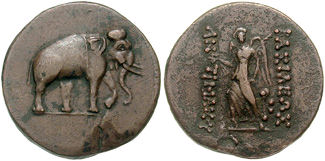Demetrius I (Greek: Δημήτριος Α΄), also called Dharmamita or Damaytra, was a Greco-Bactrian/Indo-Greek (Yona in Pali language, "Yavana" in Sanskrit) king (reigned c. 200–180 BCE), who ruled areas from Bactria to ancient northwestern India. He was the son of the Greco-Bactrian ruler Euthydemus I and succeeded him around 200 BCE, after which he conquered extensive areas in what is now Afghanistan and Pakistan.
He was never defeated in battle and was posthumously qualified as the Invincible (Aniketos) on the pedigree coins of his successor Agathocles. Demetrius I may have been the initiator of the Yavana era, starting in 186–185 BCE, which was used for several centuries thereafter.
"Demetrius" was the name of at least two and probably three Greek kings of Bactria. The much debated Demetrius II was a possible relative, whereas Demetrius III (c. 100 BCE), is known only from numismatic evidence.
Demetrius I, son of Euthydemus I.
While he was still crown prince of Bactria, Demetrius conducted, on behalf of his father, negotiations with the Seleucid Antiochus III in 206-05 BCE. Antiochus considered Demetrius “worthy of kingship because of his distinction, conversational rapport, and capacity for leadership” and promised him one of his own daughters in marriage.The term used for "young prince" is neaniskos (νεανίσκος), suggesting an age around 16, which in turn gives a birth date for Demetrius around 222 BCE.Having succeeded to the throne of Bactria, Demetrius campaigned in India, making apparently extensive conquests (Polybius, 11.39).
Demetrius started the invasion of northwestern India in 180 BCE, following the destruction of the Mauryan dynasty by the general Pushyamitra Shunga, who then founded the new Indian Shunga dynasty (185–78 BCE). The Mauryans had diplomatic alliances with the Greeks, and they may have been considered as allies by the Greco-Bactrians.The Greco-Bactrians may also have invaded India in order to protect Greek populations in the subcontinent.
Demetrius may have first started to recover the province of Arachosia, an area south of the Hindu Kush already inhabited by many Greeks but ruled by the Mauryas since the annexation of the territory by Chandragupta from Seleucus. In his "Parthian stations", Isidorus of Charax mentions a colony named Demetrias, supposedly founded by Demetrius himself:
"Beyond is Arachosia. And the Parthians call this White India; there are the city of Biyt and the city of Pharsana and the city of Chorochoad and the city of Demetrias; then Alexandropolis, the metropolis of Arachosia; it is Greek, and by it flows the river Arachotus. As far as this place the land is under the rule of the Parthians."
"Parthians stations", 1st century BCE
A Greek dedication inscribed on stone on an altar of Greek Goddess Hestia and discovered in Kuliab, 100 kilometers northeast of Ai-Khanoum, also mentions the victories of the prince Demetrius during the reign of his father:
"Heliodotos dedicated this fragrant altar (...) so that the greatest of all kings Euthydemus, as well as his son, the glorious, victorious and remarkable Demetrius, be preserved of all pains, with the help of the Fortune with divine thoughts". More information about the altar of Hestia in Kuliab here.
"Those who came after Alexander went to the Ganges and Pataliputra" (Strabo, XV.698)
"The Greeks who caused Bactria to revolt grew so powerful on account of the fertility of the country that they became masters, not only of Ariana, but also of India, as Apollodorus of Artemita says: and more tribes were subdued by them than by Alexander — by Menander in particular (at least if he actually crossed the Hypanis towards the east and advanced as far as the Imaüs), for some were subdued by him personally and others by Demetrius, the son of Euthydemus the king of the Bactrians." (Strabo 11.11.1[13])
It is generally considered that Demetrius ruled in Taxila (where many of his coins were found in the archaeological site of Sirkap). The Indian records also describe Greek attacks on Saketa, Panchala, Mathura and Pataliputra (Gargi-Samhita, Yuga Purana chapter). By c. 175 BCE, the Indo-Greeks ruled parts of northwestern India, while the Shungas remained in the Gangetic, Central, and Eastern India.
On the obverse of his silver coins, Demetrius is portrayed wearing the elephant-scalp headdress of Alexander the Great,
with the reverse type of a youthful Heracles crowning Himself with a garland. On a commemorative “pedigree coin” of the later Euthydemid king Agathocles, presumably a son of Demetrius, Demetrius bears the title Aníkētos (invincible), a title held by Alexander himself. After the appearance of the rival prince Eucratides in Bactria, at around 175 BCE, Demetrius returned from India (Justin, 41.6, where he is described as king of India) and besieged Eucratides’ small escort, with an army said to have numbered 60,000.
Honouring his title, Demetrius truly was never defeated in battle and was posthumously qualified as the Invincible (Aniketos) on the pedigree coins of his successor Agathocles.
Demetrius I died of unknown reasons, and the date 180 BCE is merely a suggestion aimed to allow suitable regnal periods for subsequent kings, of which there were several. Even if some of them were co-regents, civil wars and temporary divisions of the empire are most likely.
SOURCES:Encyclopedia Iranica, Wikipedia


















